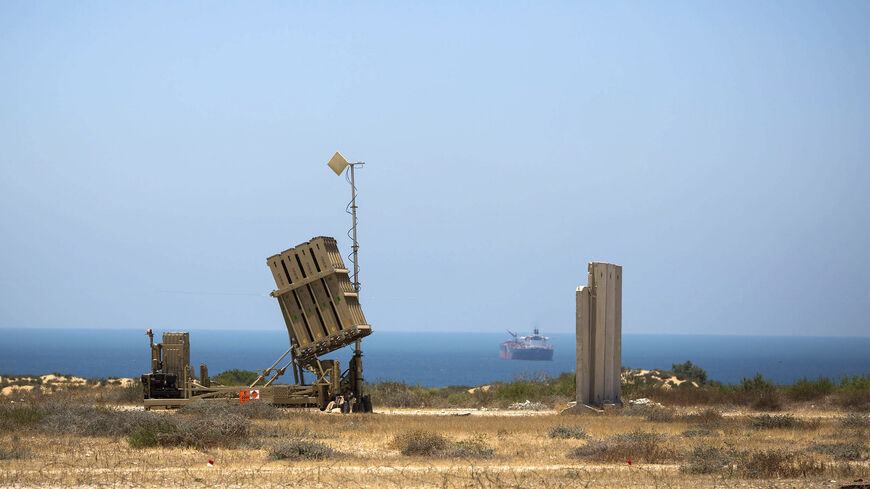Ukraine’s Ambassador to Israel Yevgen Kornichuk said Wednesday that Kyiv started testing the Israeli-developed missile alarm system aimed at warning civilians when missiles, rockets or other projectiles are launched in the area where they are located.
The promise to assist Ukraine with a warning system for civilians was made already under the former Bennett-Lapid government, but concrete steps to advancing the delivery of the system were taken during the visit of Foreign Minister Eli Cohen to Kyiv in mid-March when he met with President Volodymyr Zelenskyy. Preparing for Cohen’s trip to Kyiv, the government in Jerusalem approved the budget for the development and implementation of such a system.
Israel itself has been using a civilian alarm system for many years, especially against rocket fire from Gaza, and against missile rockets from the Lebanese border. Still, the system had to be adapted to the geographical parameters of different areas in Ukraine in order to operate optimally, a process that took a few months to execute. The system now delivered to Kyiv should identify the firing of rockets, missiles and other sorts of projectiles to calculate where they are expected to fall and how much time people in that area have to seek shelter.
Announcing that testing of the alarm system has started, Kornichuk said, “Hopefully they will finalize [the warning system] quickly and we can copy-paste it to all major cities. The Ukrainian government controls six cities with over a million residents, and we will definitely be using Israeli technology to help save people’s lives.” He added, “This is very important for our civilian and military infrastructure. It is equipment that will allow us to save lives.”
In his Wednesday announcement, Kornichuk also reiterated Kyiv’s request for Israeli assistance in clearing mines. “Over the last six months, we have liberated territory twice as large as Israel that is full of mines. Our farmers have been blown up in their tractors,” noted the ambassador, adding that Ukraine’s leading expert on clearing mines had worked in the past in Africa with Israeli companies specialized in this field. The ambassador stressed that while they do have in Ukraine the knowledge to clear mines, they do not have enough equipment to cover the large mined areas, especially now in springtime when planting season has started.
De-mining assistance
Meeting in Brussels on Tuesday with Neighborhood and Enlargement EU Commissioner Oliver Varhelyi, Cohen discussed, among other things, the possible involvement of the European Union in a Ukraine de-mining project. The two men agreed to look into a trilateral cooperation initiative where Israeli companies financed by the EU would assist Ukraine in clearing mines.
Since the Russian invasion of Ukraine on Feb. 24, 2022, Kyiv has asked Jerusalem repeatedly for military assistance. In the beginning, Israel refused categorically, fearing Russia’s reaction. The IDF coordinates with the Russian army its activities in Syrian skies. Russia is also a permanent member of the UN Security Council and a principal actor in the Iranian file. For Jerusalem, provoking Moscow is tantamount to a strategic risk it is reluctant to take. Still, faced with pressure from the United States, the EU and Ukraine, then-Defense Minister Benny Gantz agreed to send to Ukraine defensive equipment — mainly helmets and vests. The warning system now provided to Kyiv reflects the further alignment of Israel with the pro-Ukraine camp.
Israeli diplomats explained to Al-Monitor that judging by the language used recently by Kyiv, it looks like the Ukrainian leadership has come to terms with Israel not providing them with weapons. With Zelenskyy easing the pressure, so now are the Europeans. This, in turn, enables Israel to focus on what it can deliver: the warning system. The Israeli diplomats noted that this defensive/protection cooperation with Ukraine toes the line with the deepening of ties between Israel and NATO.
With pressure on weapons delivery lifted, Israel seems to have found its way to support Ukraine against Russia. This was evident this week also in the visit of Deputy Speaker of the Verkhovna Rada of Ukraine Olena Kondratiuk in Israel. Kondratiuk met with Knesset speaker Amir Ohana and with Director General of the Foreign Ministry Ronen Levy. On May 1, she visited the city of Ashkelon, located 10 kilometers (6 miles) from the Gaza border, where she saw the installation of the Israeli rocket-warning system. She also visited in Ashkelon a company that builds and equips sheltered rooms.







